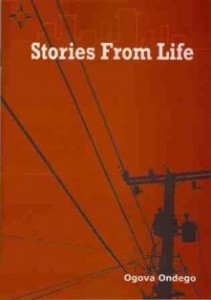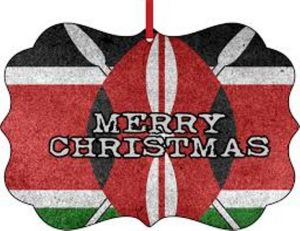By Ogova Ondego
Published December 25, 2011
 Christmas is one of the two most important holidays in my village, the other one being New Year’s Day. Everyone in the village looks forward to Christmas with great anticipation.
Christmas is one of the two most important holidays in my village, the other one being New Year’s Day. Everyone in the village looks forward to Christmas with great anticipation.
Towards the end of November each year, women and girls not only give their grass-thatched, mud-walled houses a new coat of multi-coloured soil look, but also decorate them with great solemnity, almost with a religious zeal.
At dawn, women carrying buckets, basins, baskets or tins on their heads are seen walking in long single files, heading to the rivers in forests where white, red, grey, black and yellow clay is to be found. Sometimes they also do this in the evening, especially when it is only a few days to Christmas
The drumming and singing that you never heard fill the air as churches prepare to participate in Christmas verse, carol and drama competitions. The most popular scripture is Luke 2: 1 – 7, in which the Roman Emperor, Augustus, orders a census to be taken and all Hebrews return to their ancestral homes for the exercise. It is at that time that Jesus is born in a stable as there is no room in the inn. Even non-literate women can recite for you these verses with almost angelic perfection.
RELATED: Eclectic Tanzanian Video Targets Every Music Lover
Houses are almost turned inside out on December 23; everything in them (tables, chairs, benches, cupboards) is scrubbed. Floors are swept again and again, dangling soot is cleaned from the ceilings with brooms tied to long poles, framed pictures are cleaned of smoke and rearranged; new pictures cut from newspapers or magazines are fixed on walls for the great day. Christmas messages and scriptures such as Micah 5:2 and Isaiah 9: 1-7 are inscribed on walls using clay by those whose children have gone to school. It matters not that many can hardly read, let alone speak English, the language of the formally educated.
Preparing for Christmas is accompanied with such zeal you never saw in your life. The usual cooking utensils are kept away while special dishes, brought out lovingly twice a year, leave cupboards to be used for the Christmas meal. Special meals – rice, chapati, bread, beef – eaten only on special occasions such as this one cannot be eaten from ordinary utensils! For one to eat them, one must have saved for them at the expense of other family needs. Small quarrels and fights, too, must have taken place. Together with special meals are new clothes that are also saved for throughout the year.
RELATED: Noise and Excessive Vibration Pollution Law to Hen-Peck Kenyans
 Christmas is a time to make merry. Special, home-made traditional alcoholic brews are prepared and imbibed. Young people organise overnight parties at which they dance, eat, drink and even sleep together. It is not uncommon for schoolgirls to conceive at such feasts. Only that this becomes evident a few months later.
Christmas is a time to make merry. Special, home-made traditional alcoholic brews are prepared and imbibed. Young people organise overnight parties at which they dance, eat, drink and even sleep together. It is not uncommon for schoolgirls to conceive at such feasts. Only that this becomes evident a few months later.
Family members, especially those living in urban areas such as Nairobi, make a concerted effort to travel to their rural homes. Christmas serves as a family re-union and almost no one wants to be left behind. Owners of public service vehicles, realising that demand for transport usually outstrips the available buses and matatus at Christmas, almost triple their fares. But that does not deter passengers from travelling. Why should they when they have saved for this day since the beginning of the year, January 1?
In the rural areas, children are excited that they are going to play with their urban-based brothers and sisters (not cousins!). They look forward to seeing their other fathers and mothers as terms “uncles” and “aunts” do not exist in this part of the world, unless they are referring to their mother’s brothers or father’s sisters, respectively.
RELATED: BBC to the Rescue as Radio Presentation Fails Kenyans
 On Christmas day, last minute cleaning of the dusty compound is done before tea is prepared, cow-dung removed from the boma and cattle taken to pastures up to mid morning when shouts of merriment, drumming and singing rent the air from the nearest churches. Those looking after cattle quickly tether them on pegs, provide them with plenty of Napier grass for the day and then dash home to don their new (actually mitumba, second hand) Christmas clothes, before heading to church to watch competitions.
On Christmas day, last minute cleaning of the dusty compound is done before tea is prepared, cow-dung removed from the boma and cattle taken to pastures up to mid morning when shouts of merriment, drumming and singing rent the air from the nearest churches. Those looking after cattle quickly tether them on pegs, provide them with plenty of Napier grass for the day and then dash home to don their new (actually mitumba, second hand) Christmas clothes, before heading to church to watch competitions.
Even at that time some families whose relatives have not yet arrived from Nairobi have not yet lost hope of seeing them. Whenever a matatu stops by, they hopefully look in its direction. For lucky ones, they actually see their loved sons, daughters-in-law and grandchildren.
And suddenly whoops and noisy greetings: “Little Ra, how you have grown. I need to get cattle ready for …” grandmother’s voice is drowned by a cacophony of joyful chatter. But she is understood. Her mention of cattle means that six-year-old Ra is old enough to marry and that she is preparing the bride price for his bride-to-be!
RELATED: Kenya to Survey Homosexuals Regarding HIV Transmission
Everyone laughs.
“You look thin son,” she goes on, examining her son as if he were a specimen. “Doesn’t my daughter feeds you, or are you working yourself too hard in the city?”
But in her excitement she does not wait for answers. Her mission is to make sure that she has said something about every visitor.
 “Hey Mama Ra,” she turns to her daughter-in-law, “its good to see you again. When are you giving me another ‘husband’? It has been long, don’t you think? Ra needs company.” But her in-law just smiles shyly and grandmother knowingly says, “Modern children!” shaking her head. She then leads them to the main house where members of the extended family are waiting to greet them.
“Hey Mama Ra,” she turns to her daughter-in-law, “its good to see you again. When are you giving me another ‘husband’? It has been long, don’t you think? Ra needs company.” But her in-law just smiles shyly and grandmother knowingly says, “Modern children!” shaking her head. She then leads them to the main house where members of the extended family are waiting to greet them.
After tea and bread is served, Ra runs out to play with the other children while his dad goes for a walk with his brothers and several neighbours. Mama Ra remains at home with her sisters-in-law and mother-in-law. She opens her bags and gives them Christmas gifts comprising mainly clothes and shoes. Everyone is excited and this is clearly attested to by the gleeful laughter coming from the house.
RELATED: How the Changing Economic Situation is Strangling Masculinity in Africa
Later in the day, a goat or a cow is slaughtered for the evening meal. There is peace and joy in the homestead as everyone, including neighbours, freely participates in the feast. The feasting mood goes on up to New Year’s Day. That evening, Ra and his parents travel back to Nairobi and the holiday comes to an end. Everyone starts preparing for the next eight-day Christmas.
This story is taken from Stories From Life, a compilation of short stories, poems and drama written by Ogova Ondego and published by ComMattersKenya of Nairobi in Kenya. Get your copies of ebook online or hard copies from director(at)commatterskenya(dot)com now.





